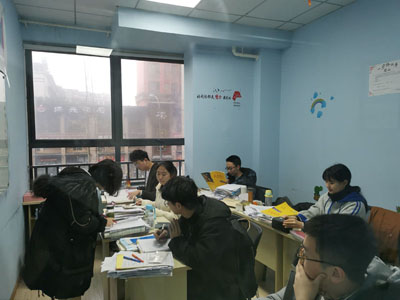
( )How many people are there in your family?
( ) 1. Daming is ___ hamburgers. He s ___ chopsticks. A.eat, use B.eating, use C.eating, using
( ) 2. --Do you use chopsticks in China? -- ____ . A. No, I do. B. Yes, I do. C. Yes, I don t.
( ) 4. -- Are you eating some sweets? -- ___ . A. Yes, I am. B. No, I don t. C. Yes, I do.
( ) 5. -- Are you writing a letter? -- _____ . A. Yes, I do. B. No, I m not. C. No, I don t.
English have English fast food. Chinese have Chinese fast food, too. Chinese use chopsticks but English use a knife and fork. Anna is from England,but she likes Chinese fast food. Look, she is eating noodles with chopsticks. They re hard for her. Jack is from England, too. He likes English fast food. But he doesn t use a knife and fork. He often has chips and hamburgers.
(二)Today is Saturday. Daming and Lingling are at home. They are making noodles for Mum and Dad. But they are very naughty. They are making lots and lots of noise(噪音). Dad is working and Mum is tidying the room. Please, be quiet, children. Dad is working. Please go to your room.
Now, Daming and Lingling are in their room. Daming is playing the drums. Lingling is playing her flute. Oh, no! The noise is bigger(更大声). Children, please go and make noodles instead Mum says.
p_ _ _ _ _ (复) 人们 i_ _ _ _ _ _ (代替) u _ _ (使用) h _ _ _ (困难的) e _ _ _ (容易的)
7、雨声里,山中的每一块岩石,每一片树叶,每
1、那沉甸甸的稻谷,像一垄垄金黄的珍珠;炸蕾吐絮的棉
3、《猴王出世》选自《 》,它是我国四大名著之一,作者是____。
花,像一厢厢雪白的珍珠;婆娑起舞的莲蓬,却又像一盘盘碧绿的珍珠。 ( )( )一丛绿草,都变成了奇妙无比的琴键。 ( )叶圣陶先生说: 工具拿在手里,必须不断地使用才能练习成熟练技能的。语文教材无非是个例子,凭这个例子要使学生能举一反三,练习阅读和写作的熟练技能。 因此,学好语文必须多听、多读、多说、多写,养成勤于实践的习惯。就以学生习作为例,每一名学生都要养成写日记的习惯,实践证明:写日记是积累作文素材,促使学生留心观察的有效方法;是练习作文基本功的最佳方式。在实际操作中,我们要学校、家庭教育相结合,家长们要认真检查孩子的日记,给予提示和鼓励,这是提高学生作文水平的有效手段。 我相信,我们班的孩子如能形成这些语文学习的良好习惯,必将是 好习惯,终受益 ,不愁学不好语文。
师:在生活中有哪
A、7:10 B、6:10 C、6:50
些测量平面图形周长的方法?(指一名学生回答。)学生用书的单词,都是围绕话
b、必定和否定句 I am from London. He is a teacher. She is in the dining room. My hair is long. Her eyes are small.
题集中归类出现的单词可以巧用实物、卡片教学生词,融第二题
元宵夜,大家一家吃完团圆饭,就去公园看烟花。公园里人山人海、热闹非凡。大伙都赶着去看烟花。
:辨字组词,这些都是学生平常容易见到的字,大多数学生都能正确区分并组词,个别学生出现错误。











 关注官方微信
关注官方微信
 关注官方微博
关注官方微博




